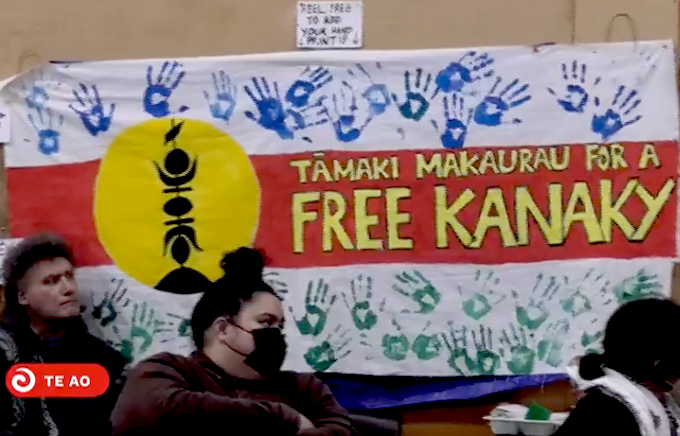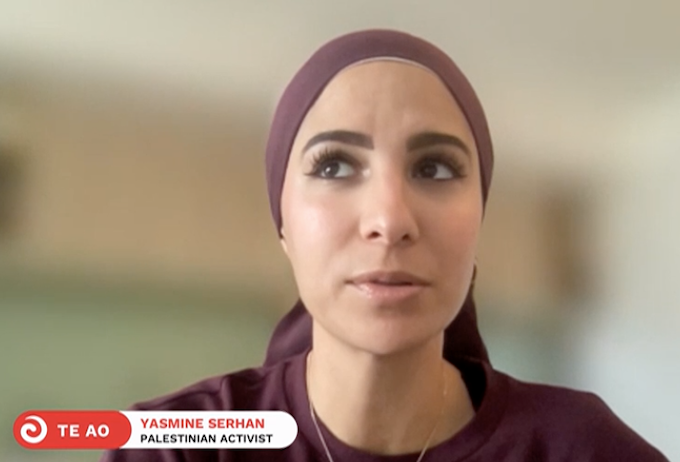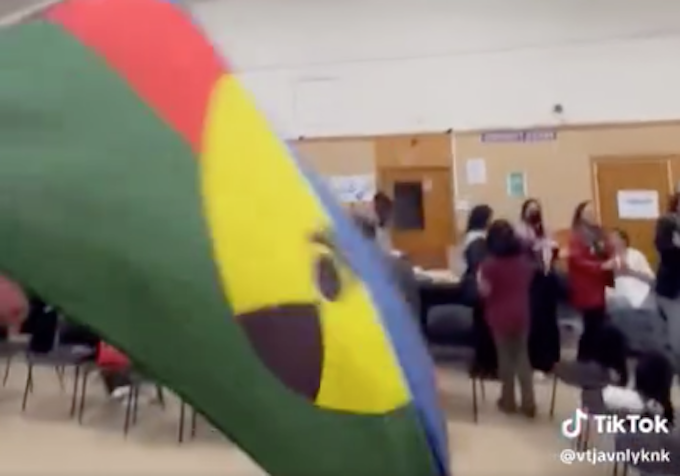
By Te Aniwaniwa Paterson of Te Ao Māori News
Kanak people in Aotearoa New Zealand are lamenting the loss of family and friends in Kanaky New Caledonia, following mass rioting and civil unrest since mid-May prompted by an electoral reform believed to threaten dilution of the indigenous voice.
A fono (meeting) at Māngere East Community Centre welcomed Kanak people who have been staying in Aotearoa since November last year and were here when the independence protests-turned-riots broke out on May 13.
The fono on the King’s Birthday holiday was in solidarity with the Kanak struggle for independence from France and drew connections between Kanaky, Aotearoa and Palestine.
- READ MORE: Kanaky New Caledonia unrest: ‘Nobody talks about what’s happening here anymore’
- Force not the answer in Kanaky New Caledonia, says PANG
- Emmanuel Macron’s gamble on New Caledonia’s crisis
- Open letter to President Macron: End Kanak vote ‘unfreezing’ and complete decolonisation
- Other New Caledonia crisis reports
A young Kanak spoke at the fono in French which was translated by a French speaker on the night.
Te Ao Māori News has chosen not to reveal the identity of these Kanaks.
“We’re here but we’re not really here because most of us are hurt,” a young Kanak man said.
“Young brothers and sisters are being killed but we know that our brothers and sisters don’t have weapons.”
“Some of our families have been killed,” said another young Kanak man whose brother had died.
“It’s difficult for us ‘cos we’re far from our land, from our home.”
Officially, seven people had died during the unrest, four of them Kanak and two police officers (one by accident). However, there have been persistent rumours of other unconfirmed deaths.
Tāngata whenua on mana motuhake for all
Bianca Ranson (Ngāpuhi and Ngāti Kahu ki Whangaroa) was one of the speakers at the fono and spoke with Te Ao Māori News the following day.
Ranson is part of Matika mō Paretīnia, a solidarity group that organises in support of the Free Palestine Movement.
“One of the key messages that we were wanting to to get across or to be able to open up discussion around was settler colonialism . .. whether that’s for us as tangata whenua here, with the current government, the attack that we’re seeing on our health, on education, whether it’s our treaty, the environment,” she said.
“But also you know when you really look at the tip of the spear, and of settler colonial violence that’s happening in other places around the world, the people of Palestine and the people of Kanaky are really on the frontline.”
Tina Ngata has also linked the struggles between Aotearoa and Kanaky and the shared visions of self-determination for Kanak and tino rangatiratanga for Māori, the French government derailing their decolonisation process and the “assimilation policies” that threaten Māori tino rangatiratanga and the right the self-determination.

Yasmine Serhan, a Palestinian raised in Aotearoa and speaker at the fono, said a highlight was Ranson inviting the Kanak community to her marae.
“I just thought that’s like the purest form of connection and solidarity to basically open your home up. Any activism that we do in Aotearoa is essentially the extension of the manaaki of tangata whenua,” she said.
“So seeing that in live action was really beautiful.”
The humanisation of resistance
Serhan also drew the connection between Kanaky, Aotearoa, and Palestine through the shared experience of settler colonialism and violent land dispossession.
“The space was set up to make it clear that our indigenous struggles aren’t in isolation and they’re not coincidental. They’re all interconnected and the liberation of one of us will lead to the liberation of all of us,” Serhan said.
“People who spoke from the Kanak community shared that they’re resisting with their bare hands. Basically, that is against an armed military force that’s been sent by France.
“It’s very similar to what’s happening in occupied Palestine, where they’re sending armed, Israeli occupational forces and people are resisting with their bare hands — basically, for their homes to be safe for their kids, for their schools, for their hospitals.”
Serhan emphasised the importance of fighting for the humanisation of resistance.
“The humanisation of our resistance happens when we share our stories, and when we continue to exist and be present in spaces.
“As a Palestinian person, my people have been resisting our erasure for 76 plus years, and for the Kanaks, it’s 150 years of living under French colonial rule.
“And we’re still here. We are the grandchildren, the mokopuna of ancestors that they’ve tried to erase and haven’t been successful in erasing.
“So our existence and presence here today is a very firm standing in our resistance.”
The barricades and unarmed Kanaks
One of the Kanaks who spoke at the fono said: “The French government has created organised militia. They have militias of local police to exterminate us.”
It was reported this week that France had deployed six more Centaures — armoured vehicles with tear gas and machine gun capabilities — to help police remove barricades.
However, a young Kanak at the fono said: “The barricades are built to protect the areas where people live. We got a video two days ago, 48 hours ago of the gendarmes, the French police, going into the suburbs where people live.
“They threw homemade gas bombs. People have found weapons from the militia, grenades, bombs and heavy artillery.”
Jessie Ounei, an Aotearoa-born Kanak woman told Te Ao Māori News there’s a lot of unchecked violence happening in Kanaky.
“It’s not being reported and the French forces are being left to their own devices.”
Ounei said there was a video released in the last few days of a young Kanak man who was going to the gas station and was shot in the face with a flash ball.
“There are right-wing civilians who see as a threat who want to . . . I guess exterminate us is the nicest way to put that.
“I just want to say that they’re not being stopped and they’re not being addressed. That’s part of the reason why we have all these checkpoints and barricades, to keep our families safe.
“To keep our people safe. We have seen that it’s not the French forces that are going to keep us safe. We have to keep ourselves safe.”

Nuclearisation and militarisation of the Pacific
Ranson talked about imperialism regarding the extraction and exploitation of Kanaky resources that has directly benefitted the settlers and disregarded Kanak leadership or their care for the whenua.
Nickel mining in Kanaky started in 1864. Kanaks were excluded from the mining industry which has led to pollution, devastated forests, wetlands, waterways, and overall destruction of Kanaky’s biodiversity.
“There’s also the positioning of France in the wider Pacific,” Ranson said.
“We have to ask ourselves, why? Why is France in Kanaky? What does that serve in the overall agenda of the French colonial project.”
At the fono speakers made the connection between France and nuclearisation.
The French have undertaken nuclear tests in Fangataufa and Moruroa of French Polynesia which media had reported an estimated 110,000 people who had been affected by the radioactive fallout between the 1960s and 1990s.
In Aotearoa, Greenpeace was protesting the French nuclear tests in Moruroa with their protest fleet the flagship Rainbow Warrior was bombed by French spies in Opération Satanique which led to the death of Portuguese-Dutch photographer Fernando Pereira.
Ranson also mentioned the coalition government’s positioning of New Zealand.
“Whether it’s with AUKUS or strengthening our connections with US, there’s some serious, serious concerns that we as indigenous people have. The implications on tāngata moana throughout Te Moana Nui A Kiwa are immense if we are heading down the dangerous pathway of moving away from being a nuclear-free and independent Pacific.”
An article published by The Diplomat discussed New Zealand and France’s “shared vision for the Indo-Pacific”, which is the strategy launched by the Biden-Harris US administration in 2022 and has been more recently adopted by the French government.
The US has also conducted nuclear tests in the Pacific in the Bikini Atoll and the Marshall Islands, and is now part of the AUKUS security pact that will lead to nuclear proliferation in the Pacific and militarisation through advanced military technology sharing.
Opponents of AUKUS argue it compromises the Rarotongan treaty for a nuclear-free zone in the South Pacific.
Susanna Ounei, the late Kanak activist and mother of Jessie Ounei, has also made the connection between decolonisation and denuclearisation of the Pacific.
Susanna delivered a speech in Kenya 1985 as part of the United Nations Decade for women.
Ounei said the colonial government claimed there were 75,000 Kanaks when they arrived, but Kanaks said there were more than 200,000 and only 26,000 after French invaded. This indicated a mass genocide.
The future of Kanaky
When asked about her dreams for Kanaky, Jessie Ounei said she wanted an independent Kanaky.
“I want our people to choose and thrive. I want our people to have the resources to discover their gifts and share it with the world. I don’t want our people to make 90 percent of the incarceration rates or 70 percent of poverty rates.”
At the end of the night, one of the young Kanaks said: “We just want our freedom. Thank you very much for your support, we all have the same fight.
Said another Kanak youth: “We are so happy that you have a thought for the young Kanaks here. That you are with us. We’re not feeling that we’re left alone because you are behind us.”
Although much of what was discussed was heavy and saddening for those in the crowd, the night ended with the crowd dancing and cheering together in solidarity with each other’s struggles and the strength to keep resisting.
Te Aniwaniwa Paterson is a digital reporter with Te Ao Māori News.













































